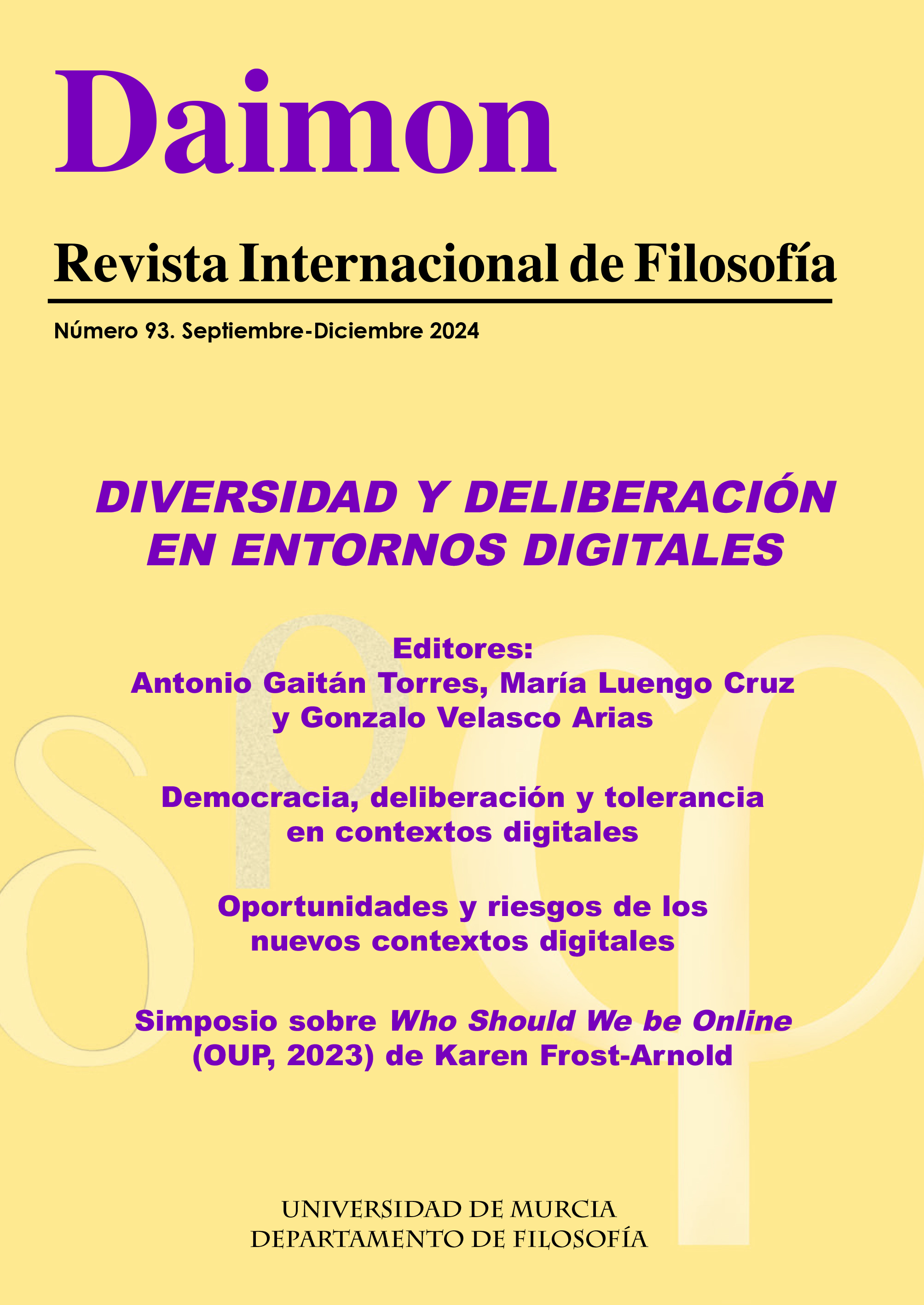Diversidad y deliberación en entornos digitales
Resumo
Introducción de los editores al número monográfico "Diversidad y deliberación en entornos digitales"
Downloads
-
Resumo519
-
PDF (Español (España))271
-
HTML (Español (España))36
Referências
Aakhus, M., & Lewiński, M. (2017). Advancing Polylogical Analysis of Large-Scale Argumentation: Disagreement Management in the Fracking Controversy. Argumentation, 31(1), 179-207.
Aakhus, M. & Lewiński, M. (2023). Argumentation in Complex Communication. Managing Disagreement in a Polylogue, New York, Cambridge University Press.
Bail, C. (2021). Breaking the Social Media Prism. How to Make our Platforms Less
Polarizing, New York, Princeton University Press
Barberá, P et al. (2015). ‘Tweeting from Left to Right: Is Online Political Communication
More Than an Echo Chamber’, Psychological Science, 1-12.
Bakshy, E., Messing, S. & Adamic, L.A. (2015). “Exposure to Ideologically Diverse
News and Opinion on Facebook.” Science 348(6239), 1130-1132.
Brady WJ, Gantman AP, Van Bavel JJ. (2020). ‘Attentional capture helps explain why moral and emotional content go viral’. Journal of Experimental Psychology General, 149 (4), pp.746-756.
Cassam, Q. (2018). Epistemic Vices, Oxford, Oxford University Press.
Cassam, Q. (2020). Extremism, London, Routledge
Castells, Manuel. (2009). Comunicación y poder, Madrid: Alianza.
Castells, Manuel. (2001). La Galaxia Internet, Barcelona: Plaza y Janés.
Chadwick, A. (2017). The Hybrid Media System. Politics and Power, Oxford, Oxford University Press
Dahlgren, P. M. (2019). Selective exposure to public service news over thirty years: The role of ideological leaning, party support, and political interest. International Journal of Press/Politics, 24(3), 293–314.
Dahlgren, P. (2005). The Internet, public spheres, and political communication: Dispersion and deliberation. Political communication, 22(2), 147-162.
De Moragas, M. (2012) (ed.): La comunicación: de los orígenes a internet, Gedisa, Barcelona.
Dubois, E., & Blank, G. (2018). ‘The echo chamber is overstated: The moderating effect of political interest and diverse media’. Information, Communication & Society, 21(5), 729–745.
Fraser, N. (1992). “Rethinking the Public Sphere: A Contribution to the Critique of Actually Democracy”, in Craig J Calhoun, Habermas And The Public Sphere. MIT Press.
Frost-Arnold, K. (2023). Who Should You Be Online? A Social Epistemology for the Internet, Oxford, Oxford University Press.
Furman, K. (2022). ‘Epistemic Bunkers’, Social Epistemology, Vol. 37, 2, pp. 197-207.
Gentzkow, M., & Shapiro, J. M. (2011). ‘Ideological segregation online and offline’ Quarterly Journal of Economics, 126(4), 1799–1839.
Habgood-Coote, J., Ashton, N. A. & El Kassar, N., (2024) “Receptive Publics”, Ergo an Open Access Journal of Philosophy 11: 5. doi: https://doi.org/10.3998/ergo.5710
Iyengar, S., & Hahn, K. S. (2009). Red media, blue media: Evidence of ideological selectivity in media use. Journal of Communication, 59(1), 19–39.
Kotsonis, A. (2020). Social media as inadvertent educators. Journal of Moral Education, 51(2), 155–168. https://doi.org/10.1080/03057240.2020.1838267
Latour, B. (2007). Reassembling the social: An introduction to actor-network-theory. Oup Oxford.
Levy, N. 2021. Bad Beliefs, Oxford, Oxford University Press.
Loader, B. D., y Mercea, D. (2011), “Networking Democracy? Social Media Innovations and Participatory Politics.” Information, Communication and Society, 14 (6), pp.757-769.
Marsili, N. (2021). ‘Retweeting: Its Linguistic and Epistemic Value’, Synthese, 198, 10457-10483
Mason, L. 2018. Uncivil Agreement, New York, Princeton University Press.
Negroponte, Nicholas.(1995). Being Digital. United States: Alfred A. Knopf.
Osorio, J. Villanueva, N. (2019). ‘Expressivism and Crossed Disagreements’, Royal Institute of Philosophy Supplement, 86, pp. 111-132.
Owen, Taylor, (2015) Disruptive Power: The Crisis of the State in the Digital Age, Oxford University Press, Oxford / Nueva York.
Parisier, Eli. (2011). The Filter Bubble: What Is the Internet Is Hiding from You.
The Penguin Press.
Sanders, L. M. (1997). Against Deliberation. Political Theory, 25(3), 347-376. https://doi.org/10.1177/0090591797025003002
Scanlon, T. (1972). “A Theory of Freedom of Expression”, Philosophy & Public Affairs”, 1 (2), pp.204-226.
Shirky, C. (2011), “The Political Power of Social Media Technology, the Public Sphere, and Political Change”, Foreign Affairs, 90 (1), pp.1-9.
Sunstein, C R. (2001). Republic.Com. Princeton: Princeton University Press.
Talisse, R. 2019. Overdoing Democracy, Oxford, Oxford University Press.
Thompson, J B. (1995). The media and modernity: A social theory of the media. Stanford University Press.
Tosi, J. Warmcke, B. (2020). Moral Grandstanding, Oxford, Oxford University Press.
Tufekci, Z. (2017). Twitter and Tear Gas. The Power and Fragility of Networked Protest, New Haven, Yale University Press.
Tucker, J. A., Guess, A., Barberá, P., Vaccari, C., Siegel, A., Sanovich, S., Stukal, D.,
& Nyhan, B. (2018). Social media, political polarization, and political disinformation: A
review of the scientific literature.
Van Bavel, J. Packer, D. 2021. The Power of Us, New York, Little Brown
Véliz, C. (2021). Privacidad es poder. Datos, vigilancia y libertad en la era digital, Madrid, Debate.
Direitos de Autor (c) 2024 Daimon

Este trabalho encontra-se publicado com aLicença Internacional Creative Commons Atribuição-NãoComercial-SemDerivações 3.0.
Las obras que se publican en esta revista están sujetas a los siguientes términos:
1. El Servicio de Publicaciones de la Universidad de Murcia (la editorial) conserva los derechos patrimoniales (copyright) de las obras publicadas, y favorece y permite la reutilización de las mismas bajo la licencia de uso indicada en el punto 2.
2. Las obras se publican en la edición electrónica de la revista bajo una licencia Creative Commons Reconocimiento-NoComercial-SinObraDerivada 3.0 España (texto legal). Se pueden copiar, usar, difundir, transmitir y exponer públicamente, siempre que: i) se cite la autoría y la fuente original de su publicación (revista, editorial y URL de la obra); ii) no se usen para fines comerciales; iii) si remezcla, transforma o crea a partir del material, no podrá distribuir el material modificado.
3. Condiciones de auto-archivo. Se permite y se anima a los autores a difundir electrónicamente las versiones pre-print (versión antes de ser evaluada) y/o post-print (versión evaluada y aceptada para su publicación) de sus obras antes de su publicación, ya que favorece su circulación y difusión más temprana y con ello un posible aumento en su citación y alcance entre la comunidad académica. Color RoMEO: verde.











